Serving 1,183 students in grades Prekindergarten-5, Dacula Elementary School ranks in the top 50% of all schools in Georgia for overall test scores (math proficiency is top 50%, and reading proficiency is top 50%).
The percentage of students achieving proficiency in math is 40% (which is higher than the Georgia state average of 37%). The percentage of students achieving proficiency in reading/language arts is 41% (which is higher than the Georgia state average of 40%).
The student:teacher ratio of 13:1 is lower than the Georgia state level of 14:1.
Minority enrollment is 76% of the student body (majority Black and Hispanic), which is higher than the Georgia state average of 65% (majority Black).
Quick Stats (2025)
- Grades: Prekindergarten-5
- Enrollment: 1,183 students
- Student:Teacher Ratio: 13:1
- Minority Enrollment: 76%
- Overall Testing Rank: Top 50% in GA
- Math Proficiency: 40% (Top 50%)
- Reading Proficiency: 41% (Top 50%)
- Science Proficiency: 38% (Top 50%)
- Source: National Center for Education Statistics (NCES), GA Dept. of Education
Top Rankings
Dacula Elementary School ranks among the top 20% of public schools in Georgia for:
Category
Attribute
Diversity
School Overview
Dacula Elementary School's student population of 1,183 students has grown by 5% over five school years.
The teacher population of 90 teachers has grown by 30% over five school years.
Grades Offered
Grades Prekindergarten-5
Total Students
1,183 students
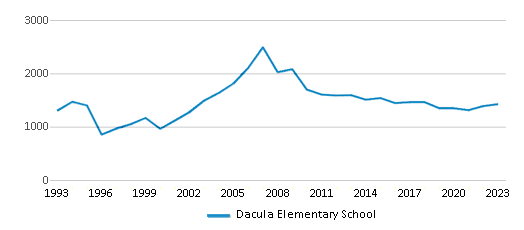
Gender %
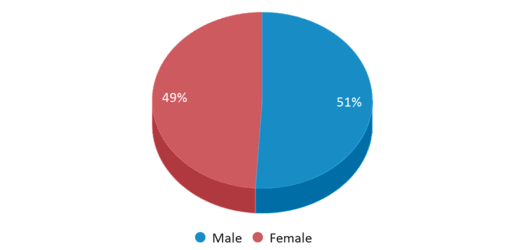
Total Classroom Teachers
90 teachers
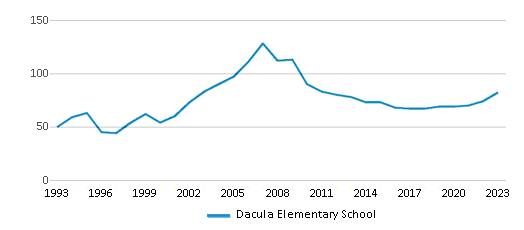
Students by Grade
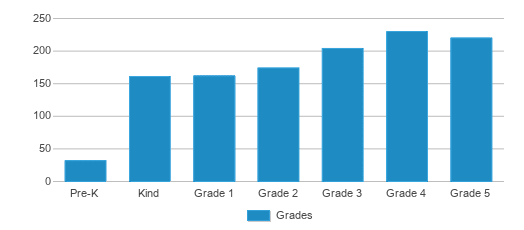
School Calendar
School Rankings
Dacula Elementary School ranks within the top 50% of all 2,204 schools in Georgia (based off of combined math and reading proficiency testing data).
The diversity score of Dacula Elementary School is 0.75, which is more than the diversity score at state average of 0.71. The school's diversity has stayed relatively flat over five school years.
Overall Testing Rank
#829 out of 2204 schools
(Top 50%)
(Top 50%)
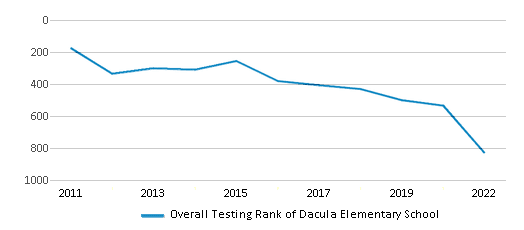
Math Test Scores (% Proficient)
40%
37%
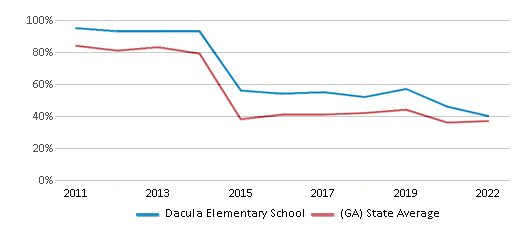
Reading/Language Arts Test Scores (% Proficient)
41%
40%
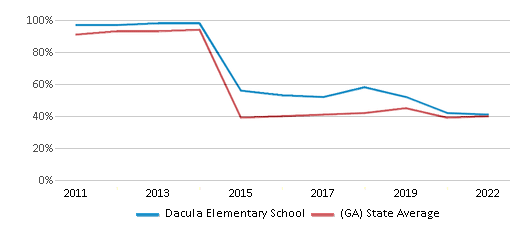
Science Test Scores (% Proficient)
38%
40%
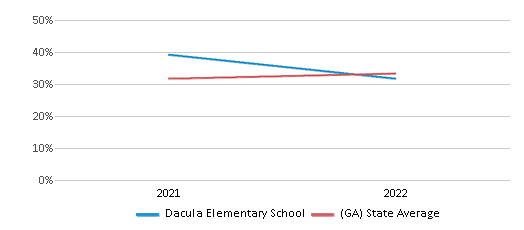
Student : Teacher Ratio
13:1
14:1
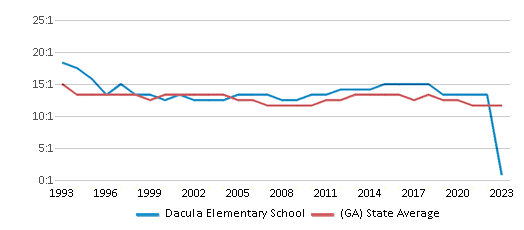
American Indian
n/a
n/a
Asian
6%
5%
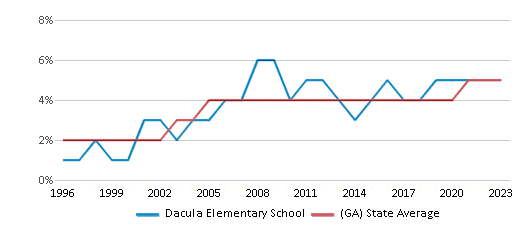
Hispanic
29%
19%
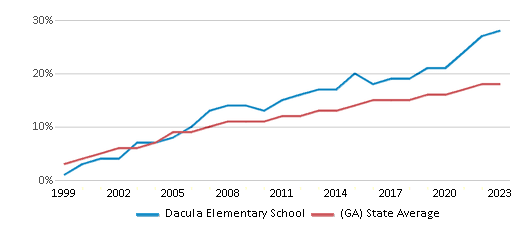
Black
33%
36%
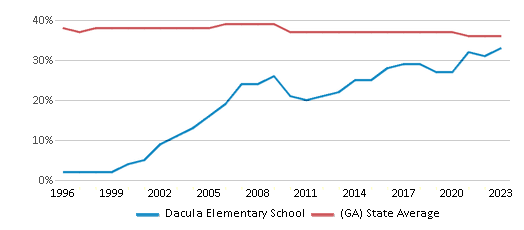
White
24%
35%
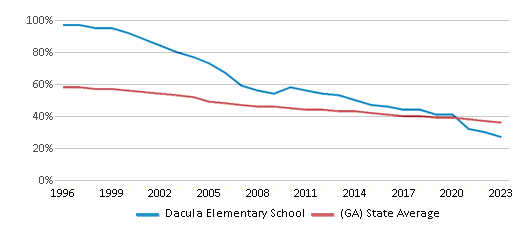
Hawaiian
n/a
n/a
Two or more races
8%
5%
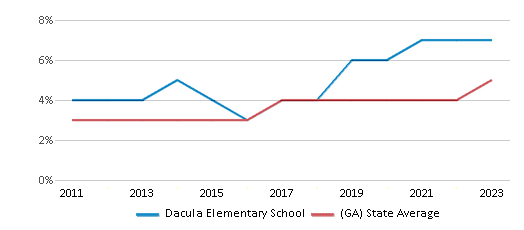
All Ethnic Groups
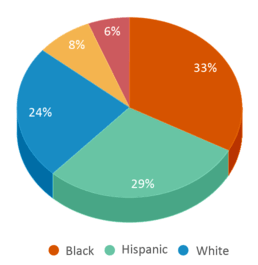
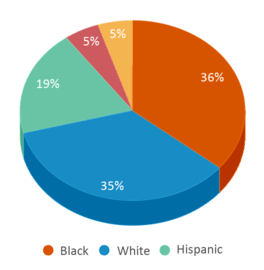
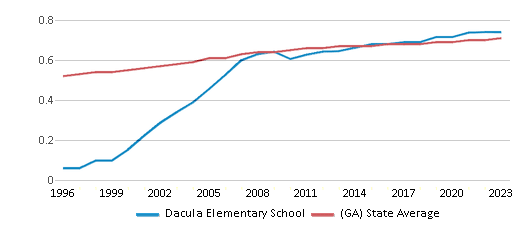
Participates in the National School Lunch Program (NSLP)
Yes
Eligible for Free Lunch
56%
59%
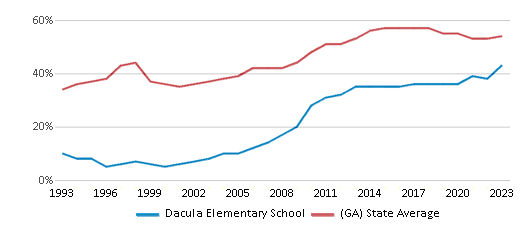
Eligible for Reduced Lunch
10%
5%
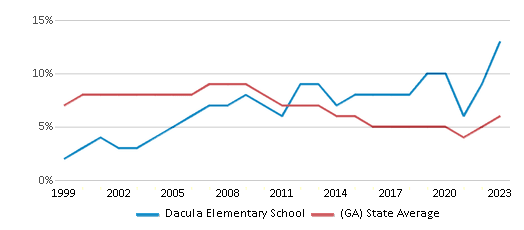
School Statewide Testing
School District Name
Source: National Center for Education Statistics (NCES), GA Dept. of Education
Profile last updated: 02/09/2025
Frequently Asked Questions
What is Dacula Elementary School's ranking?
Dacula Elementary School is ranked #829 out of 2,204 schools, which ranks it among the top 50% of public schools in Georgia.
What percent of students have achieved state testing proficiency in math and reading?
40% of students have achieved math proficiency (compared to the 37% GA state average), while 41% of students have achieved reading proficiency (compared to the 40% GA state average).
How many students attend Dacula Elementary School?
1,183 students attend Dacula Elementary School.
What is the racial composition of the student body?
33% of Dacula Elementary School students are Black, 29% of students are Hispanic, 24% of students are White, 8% of students are Two or more races, and 6% of students are Asian.
What is the student:teacher ratio of Dacula Elementary School?
Dacula Elementary School has a student ration of 13:1, which is lower than the Georgia state average of 14:1.
What grades does Dacula Elementary School offer ?
Dacula Elementary School offers enrollment in grades Prekindergarten-5
What school district is Dacula Elementary School part of?
Dacula Elementary School is part of Gwinnett County School District.
School Reviews
5 6/16/2020
There's a lot to love about this school. The increasingly diverse student population presents a few challenges that you sometimes see reflected in less-than-stellar standardized test scores (still well above average for Georgia), but it also creates a wonderful climate where students experience and learn to embrace the diversity of others. The teachers and admins are unusually dedicated - sometimes to a fault, because you can often find them working well after school hours. I say to a fault because they aren't paid for that extra work, but that's another conversation for another day! (Full disclosure - I am not a classroom teacher and I am able to do most of my own unpaid work from home). Also exceptional are the school's facility (thanks to an award-winning custodial staff) and its clubs and activities, including a chess club, robotics club and a robust choral music program for all students K-5.
Review Dacula Elementary School. Reviews should be a few sentences in length. Please include any comments on:
- Quality of academic programs, teachers, and facilities
- Availability of music, art, sports and other extracurricular activities
Recent Articles

What Is A Charter School?
Explore the world of charter schools in this comprehensive guide. Learn about their history, how they operate, and the pros and cons of this educational innovation. Discover key facts about charter schools, including admission policies, demographics, and funding, as well as what to look for when considering a charter school for your child.

10 Reasons Why High School Sports Benefit Students
Discover the 10 compelling reasons why high school sports are beneficial for students. This comprehensive article explores how athletics enhance academic performance, foster personal growth, and develop crucial life skills. From improved fitness and time management to leadership development and community representation, learn why participating in high school sports can be a game-changer for students' overall success and well-being.

February 05, 2025
Understanding the U.S. Department of Education: Structure, Impact, and EvolutionWe explore how the Department of Education shapes American education, from its cabinet-level leadership to its impact on millions of students, written for general audiences seeking clarity on this vital institution.






